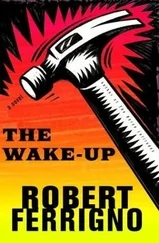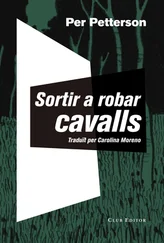Now he lies behind a screen with his face to the wall refusing to talk to me, and he is all that I have, except perhaps for a nurse in green with a first name that begins with a G and a Kurd who can speak no Norwegian except “Hi” and “Thanks”. Surely that cannot be right, but it feels like that when I drive into the garage under the block and park the Mazda with its bonnet against the wall in my corner so the neighbours will not see the big scrape along the front wing.
I go up the stairs to the ground floor and let myself in and undress in the bedroom with the radio on and I hear the Østland programme announcing that the world’s most beautiful cat has run away from its owner in Stovner. It is large with ginger stripes and is the pride of the neighbourhood, says the presenter, and I get into bed and close my eyes and sleep until the telephone starts to ring. I open my eyes again. The room is dark now. The radio is still on and the alarm clock shows it is late evening. I get up and go into the living room over to the window while the telephone rings. It is raining a little between the blocks. I have no clothes on, but in the living room too it is dark so no-one can see in. There is light in Mrs Grinde’s apartment. She stands by the dumb waiter with the telephone in her hand. That is what it looks like, at least at a distance, and my phone is still ringing. She turns and looks out of the window towards my apartment, and then she lowers her arm. The ringing stops. I stay there in front of the big window and she goes on standing in front of hers with a hand on what must be the telephone, and I am sure she is biting her lip and shifting her weight from foot to foot. Not impatiently, but restlessly maybe, at a loss.
I go back to the bedroom and switch the radio off and lie down under the duvet, close my eyes and try to go back to sleep. But it is no good. I try to think of nothing, but that doesn’t work either, and then I just lie looking up into the darkness, thinking about my father. The Danish lady in his wallet. She was never mentioned. I try to recall what it was Aunt Solgunn told me: that he met her in Copenhagen a year before he got married when he went there with leave from the factory where he had been since he was fourteen. He was like the others in the family, with the exception perhaps of Uncle Alf, and never had a day’s absence, if you don’t count four days in hospital after a ski-jumping accident which turned his back into his weakest point, and now he had been given a grant to go and see how the Danes made shoes, whether he could learn something there, which he doubted, but still he was eager to go. There had been a fire at his factory, everything had to be rearranged and they were waiting for new machinery, and if he was to go, it had to be then. So they let him go, and when he was back he was sure they would make him foreman.
The first factory was owned by a co-operative run on trade union lines, and the thing that struck him straight away was that the workers thought he was Swedish, and they did not understand what he said if he talked at his usual speed, although he understood them well enough. He thought that was funny and slightly irritating, for if my grandfather was Swedish, my father was Norwegian , and the biggest things for him after the establishment of the Norwegian Federation of Labour was Fridtiof Nansen’s skiing journey across the Greenland ice and Roald Amundsen’s victorious race to the South Pole. The second thing he noticed was that beer and schnapps were on sale at lunchtime in the canteen, where the workers played dice incessantly, and he thought that even more funny and quite exotic, even though he could not see how it might increase production. But they had music while they worked and ten minutes’ obligatory exercise towards the end of the shift every single day. He liked both things and he liked the idea of the workers having their own factory which supplied them with good shoes they could buy in their own shops all over the country and not the cheap shit he knew was on its way on to the market from places where they did not have a clue. And he liked the daughter of the assistant manager who was put in charge of him for the first week. He met her at the office on the second day, where she sat behind a desk and was a secretary with very smooth, shining blonde hair. She talked efficiently on the telephone, her left hand drawing pictures in the air he had to follow with his eyes, and when she raised her head and said something in Danish he thought was the beginning of a song, he was a goner. Her father, the assistant manager, had once been a worker and later foreman, and after a few days my father thought if he just persevered and learned still more, nothing was impossible. He had thought that before, quite often, in fact, and time was running out. If it was to be done, it must be done now.
And there was something about him. He was reaching out. He was still shining. The assistant manager’s daughter saw that at once. She kept her eyes on him all through the week he was at the factory, and when he went on to the next one, she kept in touch.
“I never give up,” he solemnly said at the gate, “it is not in my nature,” and then he laughed in his shy way, and she did not doubt him for a moment. Two weeks later they were secretly engaged, and when he left for home she promised to follow him soon to see what it was in his life that made him shine.
And she came. What she saw was grey rocks and ponderous spruce trees, and everything seemed suddenly so small and cramped about the narrow fjord where the forest shut out the sun, and she saw the little room where he lived alone at Number 1 Enebakkveien with the books he had bought by the greatest Norwegian authors and then some, perhaps to find something there that he could aspire to, but he never got through them. The books were dusty now, and then she would not know the titles of any of them. On the floor above were the premises of the Baptist Congregation where his father ruled like a patriarch over his family and a handful of workers whose souls had been saved, and she went out and looked at the shabby town which was not in the least like Copenhagen; no canal and golden domes, no great squares and extensive parks, no towering grandeur. But she saw the childish pride he took in all this, and her heart sank like a stone from summer to far below zero. She began to study train timetables and boat routes and presumably she said, as they used to say in B films of that era:
“Sorry, Buster, no deal,” or something to that effect, and then she left after only a few days; quite quietly and unnoticed she went back to the assistant manager and the King’s Town.
That night my father disappeared. There was to be a family gathering with all the brothers and sisters and their wives and husbands in honour of the Danish fiancée, which was no longer a secret. They wanted to see Frank Jansen finally crossing the finishing line. He was thirty-seven. But she did not come. Nor did he, and the next day he was not at work. It was a sensation. Nobody knew where he was, no-one could remember when they had actually seen him last, and after a day had passed they grew frightened and began to search. First among the friends he had, boxers and football players of the Olympic team in Berlin in 1936 which he never got to, although he had trained and trained, and then among those he knew in Bryn male voice choir, but he was not with any of them, and they searched in the cafés he went to from time to time to have a ginger ale and talk, and they were afraid he might be drunk although no-one had ever seen him drunk at any time. Finally, they organised a search party in the Østmark Forest. They carried on for three days, and the wind was howling and the rain came down as if Domesday was near, and still more and more people joined in; shoemakers and cross-country skiers, preachers and members of the choir, and one or two wrestlers with upper arms thick as birch trunks came rolling along, and they divided the forest into sections among themselves and walked past lakes and hills, up tortuous paths and down still more tortuous trails made by roe deer and elk. In the evenings they crowded together in the congregational hall with dripping clothes and spread maps out on the table in front of them where they ticked off the areas they had already covered, and next morning lorries trundled up to the parking place by the Østmark café, and from there they walked into the forest again. They shouted and sang baritone and bass through the rain that fell so heavily the voices were felled to the ground, and they shook their heads at each other, the water splashing off their sou’westers, the wet oilskins shining among the tree trunks when they flung out their arms in frustration, and they were close to giving up.
Читать дальше












